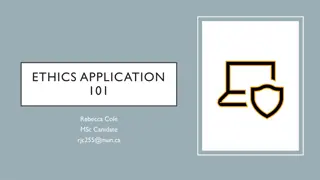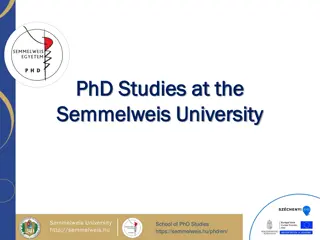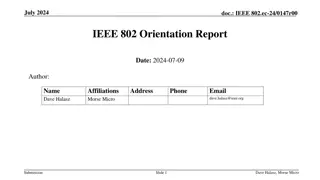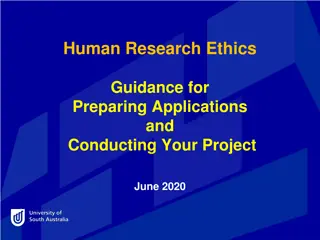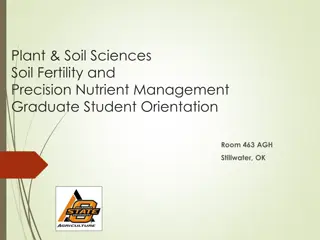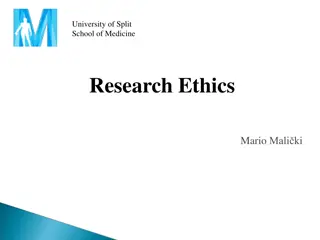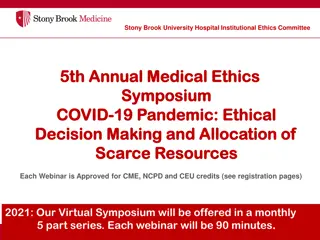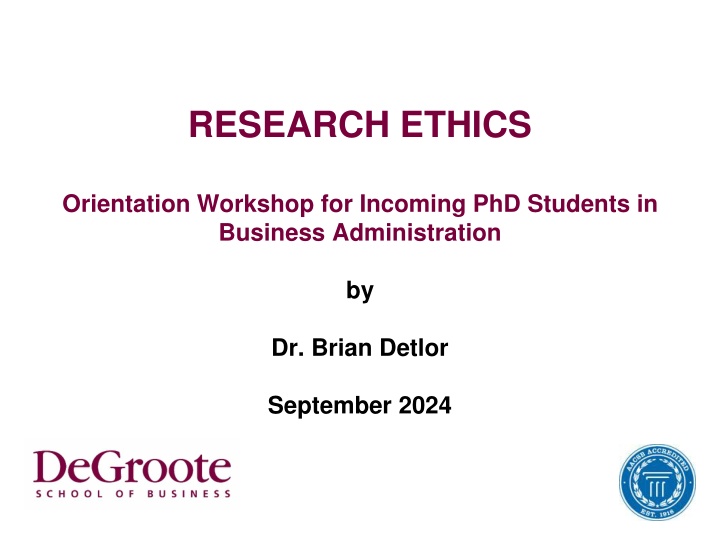
Research Ethics Workshop for PhD Students in Business Administration at McMaster University
Join the Research Ethics Orientation Workshop led by Dr. Brian Detlor at McMaster University, focusing on the importance, policies, and administration of research ethics. Understand why ethical research practices are crucial and how to ensure compliance with TCPS2 guidelines for human participant research.
Uploaded on | 1 Views
Download Presentation

Please find below an Image/Link to download the presentation.
The content on the website is provided AS IS for your information and personal use only. It may not be sold, licensed, or shared on other websites without obtaining consent from the author. If you encounter any issues during the download, it is possible that the publisher has removed the file from their server.
You are allowed to download the files provided on this website for personal or commercial use, subject to the condition that they are used lawfully. All files are the property of their respective owners.
The content on the website is provided AS IS for your information and personal use only. It may not be sold, licensed, or shared on other websites without obtaining consent from the author.
E N D
Presentation Transcript
The Campaign for McMaster University The Campaign for McMaster University RESEARCH ETHICS Orientation Workshop for Incoming PhD Students in Business Administration by Dr. Brian Detlor September 2024 AACSB Accreditation
About the Speaker Dr. Brian Detlor Professor (Information Systems) McMaster Research Ethics Board (MREB): Vice-Chair (July 2022 June 2024) Chair (July 2011 June 2015) Member (July 2003 June 2006) School of Business Student Research Ethics Committee (SBSREC): Chair (Jan 2002 June 2003) Member (July 2000 Dec 2001) AACSB Accreditation
What We Will Talk About? What is research ethics? Why is it important? What policies govern research ethics @ McMaster? How is research ethics administered @ McMaster? What types of research need ethics clearance? What things do reviewers look for when reviewing an research ethics application? What research ethics resources exist @ McMaster? How does one submit a research ethics application @ McMaster? AACSB Accreditation
Research Ethics What is it? Researchis defined as an undertaking intended to extend knowledge through a disciplined inquiry or systematic investigation (Tri-Council Policy Statement: Ethical Conduct for Research Involving Humans) Research ethics pertains to the ethics around the planning, conduct, and reporting of research. The main objective is to protect human participants by examining specific research activities such as the management of risk, the protection of confidentiality, and the process of free and informed consent AACSB Accreditation
Research Ethics Why is it important? To ensure good ethical research practice is followed To be in compliance with the Tri-Council Policy Statement on the Ethical Conduct for Research Involving Humans (TCPS2) All research at McMaster (e.g., by students, faculty, staff, research in the classroom) involving human participants and/or their personal records, whether or not funded by one of the Tri-Councils, must adhere to the TCPS 2 The Tri-Councils audits McMaster annually for compliance If in violation, research funding to the university could be withheld! AACSB Accreditation
Policies & Guidelines McMaster s: Research Involving Human Participants (2002)
Policies & Guidelines McMaster s: Research Integrity Policy (2017)
Policies & Guidelines Canada s: Tri-Council Policy Statement Ethical Conduct for Research Involving Humans (TCPS 2nd ed. - 2022)
Policies & Guidelines TCPS 2: CORE-2022 (Course on Research Ethics) Consists of nine modules and a knowledge consolidation exercise Each module ends with 4-5 quiz questions The knowledge consolidation exercise consists of 25 randomly-selected multiple-choice questions from a question bank To obtain a CORE-2022 Certificate of Completion, you will need to correctly respond to 20 questions (80%) You can retake the knowledge consolidation exercise as many times as needed
Research Ethics Boards @ Mac HiREB Hamilton Integrated Research Ethics Board Oversees research conducted by: Faculty, staff or students in the Faculty of Health Sciences, Hamilton Health Sciences (HHS) or Saint Joseph Healthcare Hamilton Other McMaster researchers utilizing HHS patients (including human biological materials) with their research. AACSB Accreditation
Research Ethics Boards @ Mac MREB - McMaster Research Ethics Board Oversees all other research at Mac not reviewed by the HiREB conducted by faculty, staff or students Is an arms-length body (autonomous entity) within the university Adopts a participant and proportionate perspective towards research when reviewing research protocols AACSB Accreditation
MREB Governance Chair Tara La Rose (Social Work) Vice-Chairs David Ogborn (Communications Studies & Media Arts) & Niko Yiannakoulias (Geography & Earth Sciences) Administrative Support Nick Caric (Assistant Director Research Ethics) Karen Henderson (Research Ethics Officer) Lisungu Chieza (Research Ethics Advisor) Nicole Gervais (Research Ethics Advisor) Board Members About 30 people comprising McMaster faculty, staff & community members AACSB Accreditation
Types of Reviews Handled by MREB Full review Protocols with more than minimal risk, tricky protocols, or protocols which are good examples for the educational training of Board members Reviewed by all members of the Board Discussed at a monthly Board meeting Researchers involved in the protocol often are invited to be present at the Board meeting where their protocol is discussed AACSB Accreditation
Types of Reviews Handled by MREB Delegated review Most common type of review Pertains to minimal risk research Involves independent reviews by at least one Board Member, followed by a decision by the Chair Delegated reviews can be referred to a full REB review (if warranted) Decisions on delegated reviews must be well documented and formally reported to MREB in a timely & appropriate manner AACSB Accreditation
Types of Reviews Handled by MREB Executive review Pertains to amendments to previously approved protocols and to protocols approved by REBs at other institutions Involves a review and decision by the Chair Executive reviews can be referred to a delegated review or a full review (if warranted) AACSB Accreditation
SRECs Student Research Ethics Committees MREB delegates the review of course-based research, as well as thesis-based research by undergraduate students to SRECs Anthropology/Religious Studies & Geography SREC Business and Engineering SREC Health Aging & Society SREC Humanities SREC Kinesiology SREC Labour Studies SREC Psychology SREC Sociology SREC AACSB Accreditation
What Requires MREB Review? (Non-medical) research involving living human participants (and their personal records) Pilot studies require MREB review Note that validation of survey instruments, and initial discussions with organizations about conducting research, are not considered pilot studies (these activities do not require MREB review) AACSB Accreditation
What Doesnt Require MREB review? The following research is exempt by TCPS 2: Research that relies exclusively on publicly available information, the observation of people in public places, or the secondary use of anonymous information Quality assurance/improvement studies, program evaluation activities, program reviews, testing within normal educational requirements used exclusively for assessment, management or improvement purposes Creative practice activities (e.g., artist creations or interpretations of works of art) AACSB Accreditation
Multi-Jurisdictional Review Some organizations/communities have their own their Research Ethics Committees e.g., Indigenous communities, school boards, correctional services Canada, hospital REBs Research conducted outside Canada must meet any review requirements (REB or similar) at the research site If no such review body exists, MREB practice is to recruit an arms- length ad hoc advisor with some knowledge of the local context, if necessary, to provide quick feedback on the protocol AACSB Accreditation
Things MREB Looks At Initial Review Is the application complete? Key obvious concerns are identified and the researchers are asked to address them before submitting the application for formal review AACSB Accreditation
Things MREB Looks At Formal Review Who are the participants? Any marginalized populations? Any unjust exclusion of participants? Any conflicts of interests? Power dynamics? How is recruitment done? Are 3rd parties involved? Are incentives coercive? What data collection activities will participants be involved with? What are the risks? Should the methods be altered to reduce the risks? Are the risks worth the benefits of the study? Will the proposed methods achieve the study s purpose? Is any personal information being collected? Does this information need to be collected? AACSB Accreditation
Things MREB Looks At Formal Review (cont d) Does the Letter of Information/Consent give an accurate and complete description that allows participants to make a fully informed decision to consent? Is the process and documentation of consent appropriate? Is parental/surrogate consent required? Is there an assent process? If this is deception research, is the deception justified and is the debriefing plan sufficient? Is the withdrawal process appropriate? Is there proper handling of data in terms of confidentiality and security? AACSB Accreditation
Research Ethics Resources MREB Resources https://research.mcmaster.ca/home/support-for- researchers/ethics/macrem/macrem-templates/ Consent Samples Recruitment Script Samples Data Collection and Research Methods Confidentiality and Data Security Samples Research Involving Canadian First Nations, Inuit and Metis Peoples Managing Risks MacREM How-To Guides for Applicants AACSB Accreditation
How to Apply for Research Ethics Complete the ethics application in MacREM https://reo.mcmaster.ca/macrem Get your PhD supervisor s feedback on the form Get advice from the Ethics Office, as needed ethicsoffice@mcmaster.ca It takes 4-5 weeks to hear back from MREB after submitting a complete application (i.e., after the initial review) IMPORTANT You can t start recruiting participants or collecting data until you receive clearance AACSB Accreditation
How to Apply for Research Ethics Tips for Filling Out the Form READ the instructions obvious right? Provide the details being asked for that question Use lots of white space, sub-headings, & break large blocks of text into smaller portions Before submitting your application, check to see that you haven t left out details, forgot supporting documents, and are consistent between what you said in the application form and what you said in your supporting documents Ask your PhD supervisor for past applications to use as a sample to fill out your application Have a friend read over your application before submitting AACSB Accreditation
Questions? AACSB Accreditation



